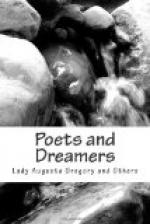’The loved ones my life
would have nourished
Are foodless,
and bare, and cold.
My flocks by their fountain
that flourished
Decay on the mountain
wold.’
But there is one mistranslation for whose sake we must forgive many others, for it has given the sad refrain that has often been on Irish lips:—
’Seaghan O’Dwyer
a Gleanna,
We’re worsted in the
game!’
Here are one or two of the many verses sung to the Little Black Rose by her lovers, poor or royal:—
’There is love through and through me for you all the length of a year; sore love, vexing love, lasting love, love that left me without health, without a road, without running; and for ever, ever, without any sway at all over my Fair Black Rose.
’I would travel through Munster with you, and the boundaries of the hills, if I thought I could find your secret, or a part of your love. O branch of the tree, it seems to me that you love me; that the flower of kind women is my Fair Black Rose.’
‘My heart leaps up with my bright Stuart!’ James and Charles are, I think, the only English kings whose names, as it were by accident, have found their way into Irish song. And it is likely they are the last to find a place there, for the imagination of Ireland still tilts the beam to the national side; and the loyalty the poets of many hundred years have called for, is loyalty to Kathleen ni Houlihan. ’Have they not given her their wills, and their hearts, and their dreams? What have they left for any less noble Royalty?’
1902.
AN CRAOIBHIN’S POEMS
’"I would much rather (and I take every occasion of making this protest) write, so to say, in a dead language and for a dead people, than write in those deaf and stammering (sorde e mute) tongues, French and English, notwithstanding they are the fashion with their rules and exercises.” This is so with me. Alfieri wrote these words a hundred years ago, and they express what is in my own mind. I would like better to make even one good verse in the language in which I am now writing, than to make a whole book of verses in English. For if there should be any good found in my English verses, it would not go to the credit of my mother, Ireland, but of my stepmother, England.’
I have translated this from Douglas Hyde’s preface to his little book of poems, lately published in Dublin, Ubhla de’n Craoibh, “Apples from the Branch.” An Craoibhin Aoibhin, “The delightful little branch,” is the name by which he is called all over Irish-speaking Ireland; and a gold branch bearing golden apples is stamped on the cover of his book. The poems had already been published, one by one, in a weekly paper; and a friend of mine tells me he has heard them sung and repeated by country people in many parts of Ireland—in Connemara, in Donegal, in Galway, in Kerry, in the Islands of Aran.




